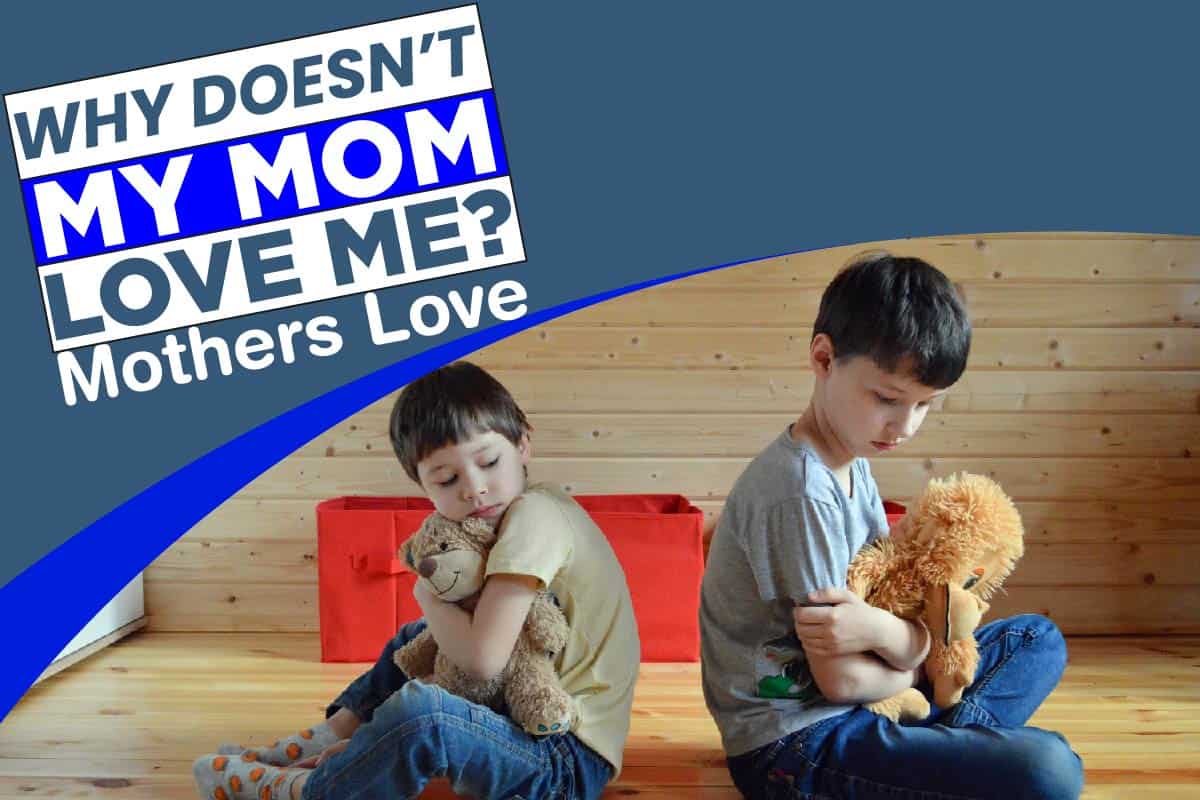Why Doesn’t My Mom Love Me? Mothers Love
Share
No matter the child’s age, everyone needs their mother’s love. Mother’s love does nurture and support the evolution of the child’s unique personality.
Parental love includes physical affection, tenderness, respect, good treatment. It can also be genuine expressions such as a smile or a friendly look that conveys good humor and empathy.
However, some parents knowingly or unknowingly engage in mistuned, insensitive, and harmful behaviors to their kids.
Such treatments do break most of the children. It makes the kids question their existence. It’s painful to know that the one person who brought you to this world does not love you. Do you feel you have enough reasons to think your mother doesn’t love you?
Here is the response to the question.
Why doesn’t my mom love me?
Although it is unfortunate, your mom may not love you because of unresolved traumas, inadequate parenting skills, financial pressure, and prenatal stress, just to mention a few. The reasons may vary from individual to individual, but here are some commonly known grounds.
Reasons Moms Fail To Love Their Kids
1. Negative self-image
Many moms unwittingly pass their hatred to their children because of their lousy self-image. Many do develop a negative conception of their bodies.
They then project their shame and negativity to those close to them, mainly their children. It makes it difficult for them to pass love and affection to their beautiful creations.
In general, people who can’t appreciate and love themselves are incapable of genuinely loving other people.
2. Unresolved traumas
The traumatic experiences might have emanated from their parents, friends, or strangers.
When the child reached that exact age, they were traumatized; they might react by overcompensating or by rejecting the child.
3. Difficulty in accepting love
These kinds of moms cannot show simple direct loving expressions to their kids. Most of them were hurt during their developmental years.
It makes it hard for them to accept intimacy and love from their kids. To refrain from bad childhood memories, they unconsciously distance themselves from their kids.
4. Inadequate or problematic parenting skills
Mothers who do not have the necessary parental skills tend to raise defiant, hostile, or generally unpleasant children.
Even though they are the root cause of these behaviors, mothers find it hard to love or accommodate a child with these behaviors.
5. Underdeveloped or immature mothers
Mothers who get children at an early age see their children as an unwanted, intimidating dependency load.
They hate the responsibility and extensive care that the child requires. It may make them resent their children.
Most of them feel like their child has trapped them in a life they never wanted.
6. Depression
At first, mothers may be happy, loving, and well-adjusted people. But something unexpected happens along the way and changes everything.
It might be a personal tragedy that became hard for them to bear. This tragedy then ends up changing the mother to the worst being, and they become hollow vessels. They cannot even imagine a happy future.
Depressed mothers are always emotionally unavailable. They cannot love their children or even register their existence.
7. The Narcissistic mothers
A narcissistic mother is only capable of loving a child that is a perfect mirror to her self-image. But if a child exhibits different behaviors, the mother sees him or her as a failure and a betrayal.
For example, an athletic mother would wish for an athletic daughter. When the daughter fails to emulate her mother’s athletic greatness, the narcissist mother will react with sharp criticism.
8. The preferential mothers
They are choosy; they love one child over the other child. The unloved child becomes the scape and is subject to abuse. In other words, it is impossible for them to love without abusing the other one.
A preferential mother loves it when her children are competing for her affection. It encourages envy, conflict, and jealousy among her kids.
However, this love can also switch over time. The child who was being favored in childhood becomes a scapegoat as an adult.
9. Controlling mothers
They almost have the same traits as narcissistic mothers. Authoritarian or controlling mothers always want to be in total control of their child’s life.
Most of these mothers always feel out of control in some regions of their lives. Such as at work, so they channel that feeling into their parental skills. They try regaining that sense of control by being so strict.
A controlling mother always wants to make all of her child’s life choices. From education, jobs, and even love partners. If the child challenges or makes a different choice, the mother react by rejecting the insubordinate child.
10. The screwed up mothers
Screwed-up mothers can be psychopaths, sociopaths, drug abusers, and chronic alcoholics. Some have neurological or psychological disorders that make them emotionally unavailable.
Frankly, these kinds of mothers are not to be parents. But the world decided to give them a chance.
These mothers do heinous acts to their kids like kidnapping, abusing, and killing their kids. Such actions are happening quite a lot in the US. But only a few cases are reported.
Hurt people hurt people. These mothers are broken and do not know what love is. Therefore they can’t be affectionate towards their kids.
11. Postnatal depression
it is a common problem among mothers. In the US, it affects 1 in every ten mothers within a year. It can also affect men or partners.
Mothers should seek help as soon as they feel depressed with proper support, such as therapy and self-help strategies. Most mothers make a full recovery.
However, some mothers do not go for the expert’s help. Therefore, the symptoms are never controlled.
Later, it can have a significant impact on them, their children, and family. Such mothers become emotionally derailed in the long run and cannot love their children.
12. Envy and Jealousy
All humans are jealous, even our maker is. Many women do enjoy marriage before getting kids. Then, all the love and affection of their husbands are always channeled to them.
But once a baby is born, the man’s focus and love shifts to the kid. It makes most of the mothers jealous. They even end up hating their kids for years.
13. The child may prefer the dad
At times the child may prefer spending time with their dads rather than moms. It might happen because their dad is more appreciative, enthusiastic, and attentive when interacting with them.
Instead of providing the child with an additional flavor of love or being a positive role model, she starts hating on her child and feels the child doesn’t appreciate her enough.
14. Difficult child
A difficult child can be challenging to be with and love. Instead of pleasure, they give stress and frustration to their mothers.
They make their mothers wish they had a different child. The mother then finds herself being continuously critical of the child.
They believe the child cannot do anything right. At the time, the mothers end up withdrawing from any interactions with their kids. They feel the interactions are painful and unrewarding.
15. Work and financial pressures
The mother should take care of her child. It makes the mother work for extra hours to get that extra pay. Most mothers do this to give their kids the best things in life.
But with time, they start becoming absent from their kid’s life. Some become selfish by blaming their kids on their financial responsibilities. Single mothers are the most affected group of women.
16. Disabled child
Mothers are at times embarrassed of themselves for having a disabled child. They take it personally that their child is disabled. At times they displace their frustration anger into the child and others.
Effects Of Uninvolved Parenting
A child whose uninvolved mother has raised tends to experience several issues.
The outcomes linked to uninvolved parenting include children who:
1. Lack of confidence
An unloved child does not know she is lovable. They have been criticized and ignored at every turn.
These children keep remembering the voices of their mothers. Telling them they are not intelligent, loving, or worth anything.
The sentiments continue to undermine their accomplishments and talents. If no intervention is made, the child’s life becomes miserable.
2. Lack of trust
These trust issues come from the belief that relationships are fundamentally unreliable. It affects their friendships and romantic relationships.
These kinds of children have experienced love as being involving obsession and jealousy.
3. Overly sensitive
A child becomes sensitive even to random comments. The child might worries about a word to death, to realize the person meant nothing at all. They tend to overthink and ruminate.
4. Difficulty in setting boundaries
Most kids who never got their mother’s love and attention end up being pleasers in their adult life. They can’t say no to anyone.
These kids always long for a relationship that is so intense. At times this behavior pushes their friend away.
What To Do If Your Mom Doesn’t Love You
First, you have to understand it has nothing to do with you. Maybe your mom is just incapable of loving because of problems or her emotional conflicts.
It might be because of the problems she has been carrying for quite along. And now it’s you who has to deal with the consequences. There are several things you can do for your good.
1. Talk to a friend or someone you trust
Talking about our emotions makes us feel better. Your friends can give you counsel.
However, avoid being emotionally dependent on them. Your friends will not be there every time. It might make you feel abandoned or not so important.
2. Find a counselor or therapist
They can help you with making hard life choices. Counselors can give you the support your mother never offered.
3. Do not overthink
overthinking involves making comparisons to how your mom treats your other siblings. If you not the only child. Don’t think your mom treats others better, even if it does happen. The thought will only bring you pain.
4. Be kind to yourself
To relieve the pain or forget the lousy treatment, children consider drugs. The use of alcohol, cigarettes, or marijuana only worsens the situation. Drug abuse might affect your school performance and health. Plus, addiction is a burden, and one needs money to sustain it.
5. Don’t be personal
Sometimes people say hurtful things without knowing. They might say harsh words because they are angry or frustrated. When this happens, try and think that your mother could be dealing with stress or personal problems.
Conclusion
Experts believe that maternal jealousy is projected in the forms of anger, criticism, or emotional withdrawal.
However, some moms do not know how to show love to their children. They believe the world is a cruel place and that to survive, one must be tough.
Therefore they love the olden way. They believe that being soft and emotional will turn their kids into a weak person.

















